
Bison graze at Beech Hill Farm & Bison Ranch in Waterford. Russ Dillingham/Sun Journal
WATERFORD — There are innumerable differences between bison and hobbits, the mythical creatures in “The Lord of the Rings.” But Ted Colburn, who owns Beech Hill Farm & Bison Ranch in Waterford with his wife, Doretta, makes the comparison because they both share a love for second breakfasts.
“They get up, eat, lay down, rest for a while, get up, eat again,” said Ted.
Bison have strong herd instincts and do mostly everything as a unit, staying within sight and hearing distance of one another.
“They do things as a herd. They get up and eat, most everyone will lie down together, then they get up again. They eat about nine times a day. They eat, ruminate, digest and eat more,” said Ted, noting his herd enjoys a life of leisure.

Bison graze on the ranch at Beech Hill Farm & Bison Ranch in Waterford. Russ Dillingham/Sun Journal
“We tell our bison that they’re in resort living,” said Ted. “It’s all hands off. They’re a natural animal. They’re effectively wild. What we want to do is have them think they’re out in the wild, but they can’t leave.”
According to Doretta, it doesn’t take much to impress a bison, which are commonly referred to as buffalo but are a different species. (See related story.)
“They just need enough room to roam, with good quality grass available to them,” said Doretta. The Colburns’ herd of 35 bison grazes on 30 acres of electrified, fenced-in pasture, with a front pasture facing the road and a wooded back pasture. When it gets hot, the bison sometimes migrate and take shelter from the sun under the cover of the trees. Sometimes, they bask out in hot sun. And they take well to the winter.
“It’s really a blast to see them in the wintertime. . . . The snow will come down on them, cover them up, and they’ll just lay there until they feel like standing up. It just shakes right off of them,” said Doretta.
Though Maine may not seem like a natural place for bison, according to Dave Carter, executive director of the National Bison Association, bison can be found in every state, including Hawaii.
Commonly associated with the Great Plains, Ted theorizes the animals never took to Maine — not because

Down the road from Beech Hill Farm and Bison Ranch in Waterford is Melby’s Market and Eatery, where they serve a “buffalo burger” that was featured in a Downeast Magazine article. Russ Dillingham/Sun Journal
of the climate, but the lack of open areas for them to graze. According to Ted, the climate in Maine is ideal.
“Here is the nicest, because it’s not too cold and not too hot.”
Perhaps as proof, the herd has made a nice home in Waterford. The Colburns typically send bison to “freezer camp” — slaughter them — when the males are 3 years old and females are around 2. Any longer and the males start to vie for dominance and become rambunctious to the point of destruction.
According to Ted, bison meat is a little bit sweeter than cow, and rich in omega 3s. Since bison aren’t raised on feedlots like most cattle, their meat is generally hormone free. Beech Hill Farm & Bison Ranch is typically busy from July to August, with a stream of visitors starting in June; meat is sold from a huge freezer in the farm’s store.
Bison steaks are the same cuts as beef, though known to be generally leaner and produce firmer steak.
“In some respects, it’s kind of like the grass-grazed beef that you had when you were a kid, before (farmers) started doing feedlots with lots of grain,” Ted said.
Doretta said the farm’s sign, a black silhouette of a bison, draws newcomers in.
“We also sell eggs. One year, we hung an egg sign underneath the bison and people would say, ‘Oh, bison lay eggs?’ People got a kick out of it.
“We have a lot people that come up in the summer time,” she continued, “and this becomes there annual stop. They go to Melby’s, then go to the farm.”

Beech Hill Farm & Bison Ranch in Waterford. Russ Dillingham/Sun Journal
The Colburns supply meat to Melby’s Market and Eatery, located about a mile-and-a-half down the road. According to Tracy Hill, who owns the convenience store, the establishment has fully embraced the animal.
Melby’s sign depicts the silhouette of a bison, and the store boasts a widely known bison burger, recognized in a 2017 issue of Downeast Magazine as one of the best burgers in Maine.
‘It’s a lot leaner. If you like a regular beef burger well done, you definitely wouldn’t want to eat a buffalo burger that way, because it would turn into a puck. It’s suggested at a medium cook so that it’s nice and juicy,” said Hill. “We have people that travel here for it.”
“We try to utilize Beech Hill as much as we can, but we can’t rely on them solely because we would annihilate their herd. We also order out of Wisconsin,” said Hill. “A lot of people don’t make the connection to the bison farm up the road. The best time to see them is early in the morning or late in the evening because the cars scare them.”
STARTED WITH ONE BISON
The Colburns came into the bison game about six or seven years ago; Beech Hill Farm has been in Ted’s family for many generations, starting as a traditional dairy farm. When his great-grandparents aged out of

The organic farm’s chicken coop has a long family story and other special ties to the farm in Waterford. Russ Dillingham/Sun Journal
the farm life, Colburn’s cousin took over the farm and introduced the first herd of bison to the property about 20 years ago.
“My cousin talked me into buying a bison that he would keep for me,” said Ted. Later, about six or seven years ago, the Colburns uprooted from Connecticut, bought the ranch, and Doretta commissioned her sister to paint a huge, life-size mural of one of their first bulls, Chief, on the barn wall.
The Colburns have never tried to domesticate their herd; as far as they’re concerned, the bison are wild, and are treated as such.
“When people try and domesticate them and be their buddy, the bison misunderstand and think the people are part of the herd,” said Ted. That can lead to dangerous situations.
Bison have a rigid social hierarchy: There are usually two high-ranking females and two high-ranking males in the herd. Bison regularly push each other around to assert dominance. A full-grown adult can weigh 1,000 pounds. When an animal that is used to pushing herd members around has an 800-pound size difference on its human “buddy,” bad things can happen.

Down the road from Beech Hill Ranch & Bison Ranch in Waterford is Melby’s Market and Eatery, which has embraced the bison vibe. Russ Dillingham/Sun Journal
Some bison are more sociable than others. Chief loved to use his long tongue to scoop apples from Doretta’s open palm, and some wander to the fence to greet humans. But the Colburns never enter the pasture without an exit strategy.
“We could walk out there with them one day and they could be perfectly fine and (couldn’t) care less that we’re out there. Other days, they could be bad mannered,” said Doretta. Regardless, the sheer size and power of the bison have led to some scary situations.
A few years ago, Doretta had a scare with Chief. A younger bull in the pasture was annoying him, and Chief locked eyes with Doretta, for some reason associating her with the rambunctious young bison.
“He saw me, and was pacing the fence back and forth, snorting at me. His mane was fluffed up and he was really ticked off. I though, ‘Gosh, I have to get out of his vision,’ and I peeked around and he was still looking at me. He backed up and slammed his head into one of the posts holding the fence up. I thought, ‘I don’t know if that’s going to hold.’ I jumped over another gate and ducked down into another field to get out of his vision.”
She added, “You just don’t know. If he came to me it could have stopped right there, but he also could have sent me flying.”
For such massive animals, bison are surprisingly athletic. They can do a standing jump of five feet, and can run about 35 miles an hour. And though that athleticism makes them intimidating in close proximity, Doretta said they’re a sight to behold.
They don’t have many natural predators, but coyotes can prey on calves.

A barn door at Beech Hill Farm & Bison Ranch in Waterford. Russ Dillingham/Sun Journal
On rare occasions when the herd is threatened — mostly by coyotes who wander into the pasture — the bison form a wall with the calves behind. Though Ted said they could easily outrun the coyotes and squish them, they choose to scare them off.
One morning, the herd encountered an equally massive animal. “We woke up and the herd was acting weird. Something about their presence didn’t look right. It turns out there was a moose in the farm. They weren’t afraid of the moose, but it was foreign to them,” said Doretta.
While the bison lead a pretty relaxed life, the Colburns have to work hard to make the farm profitable. They don’t make enough profit solely from the bison to support the farm operation — Ted said they’d need a herd of 300 to even come close — so the couple sell eggs, harvest and sell organic vegetables from their four gardens and take gigs off the farm. Ted retired from the Coast Guard, but still works as an inspector on ships, and Doretta is an ordained minister who also sells homemade bread at area farmers markets.
“It’s so satisfying to be able to provide for yourself. . . . There’s a real satisfying feeling. We work our tails off, and get exhausted, and sometimes we look at each other and think ‘What are we doing?’ But what we’re doing, it’s a good life, and the bison live a good life. We have a really content herd,” said Doretta.
Send questions/comments to the editors.





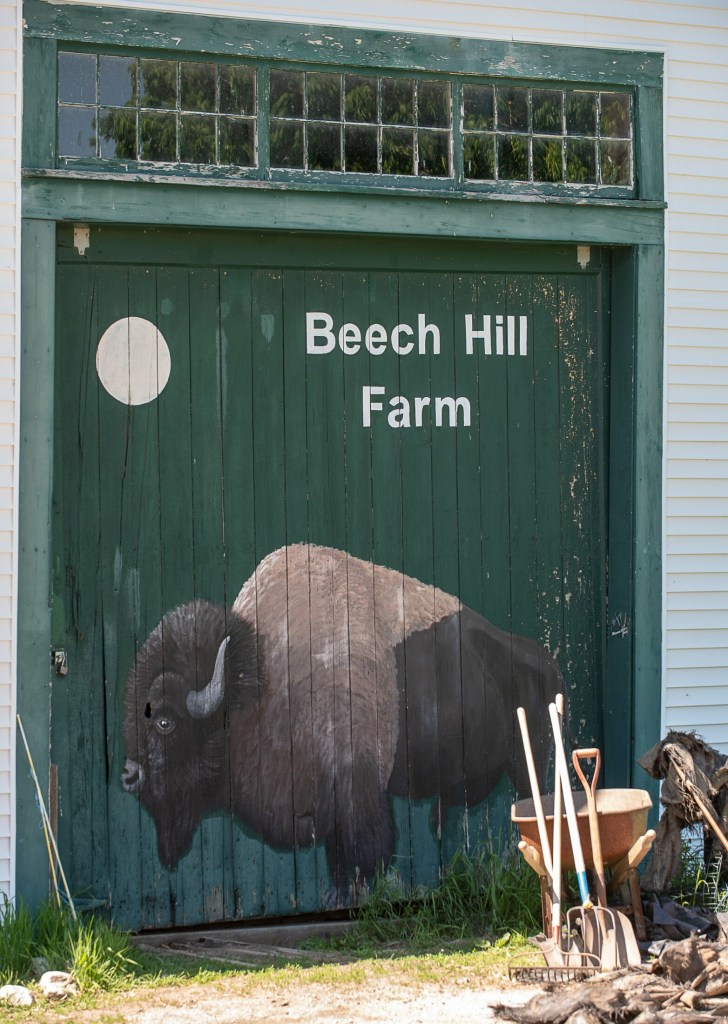
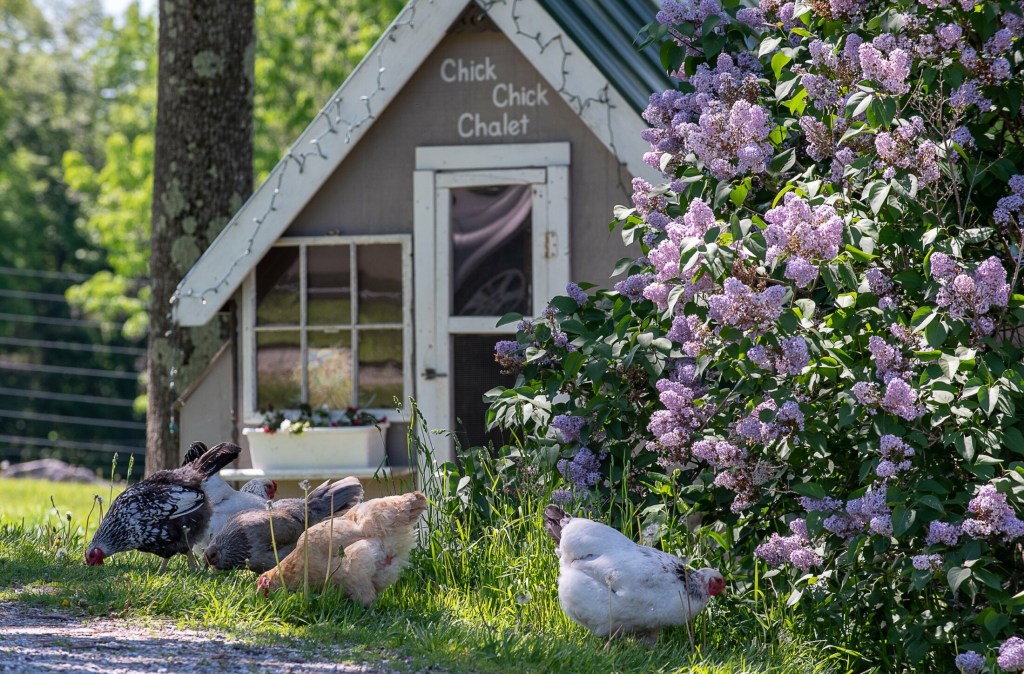
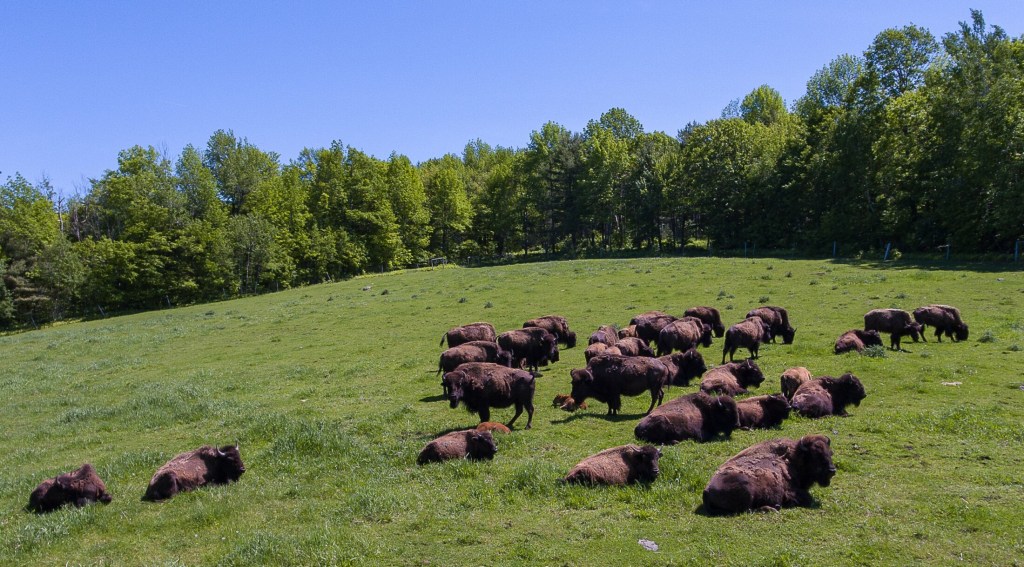

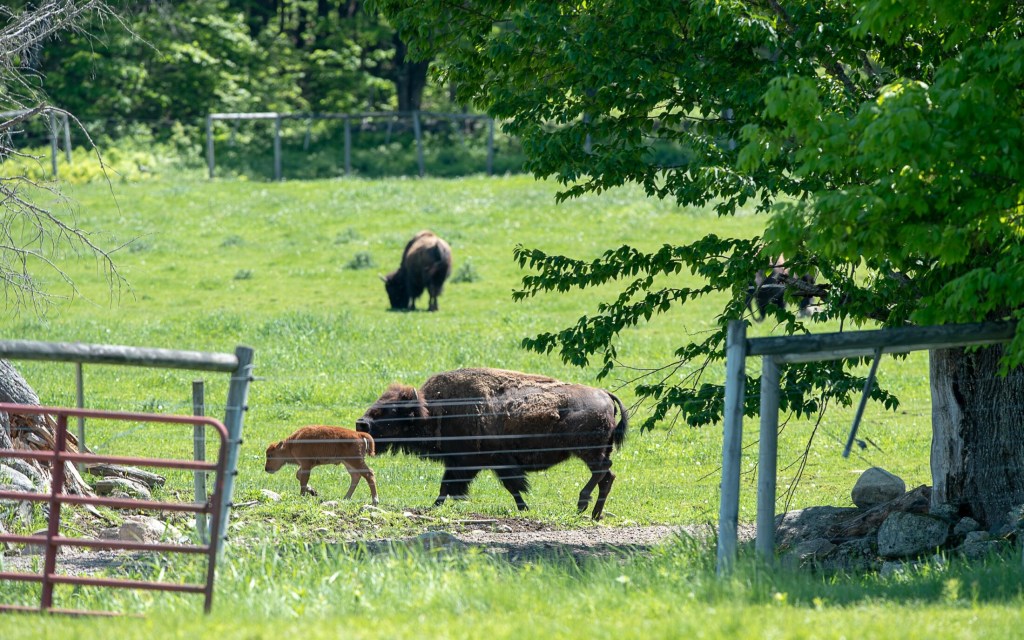


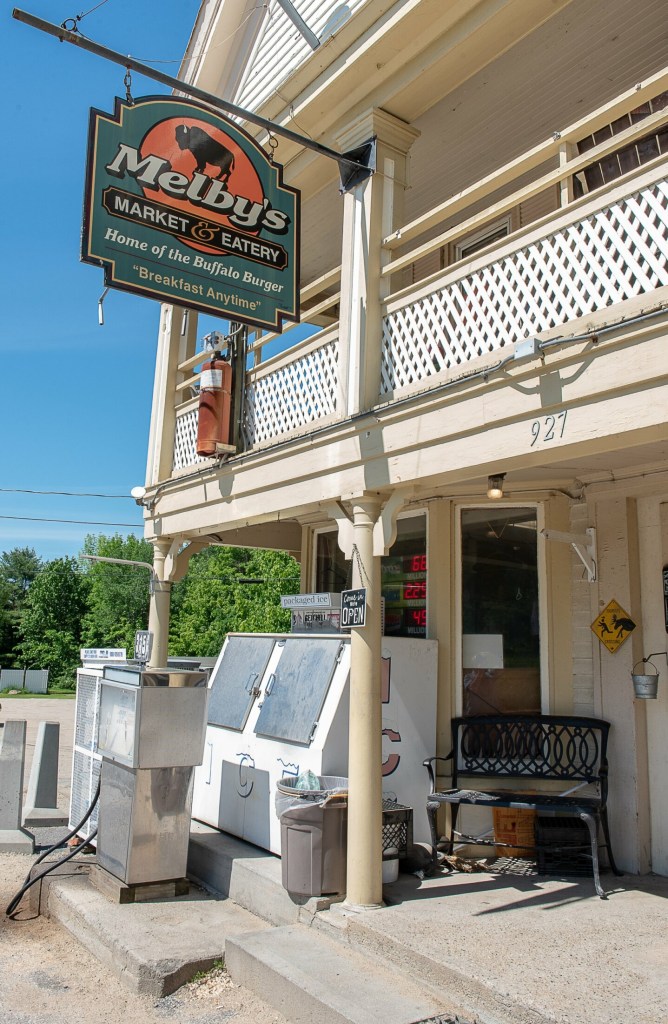
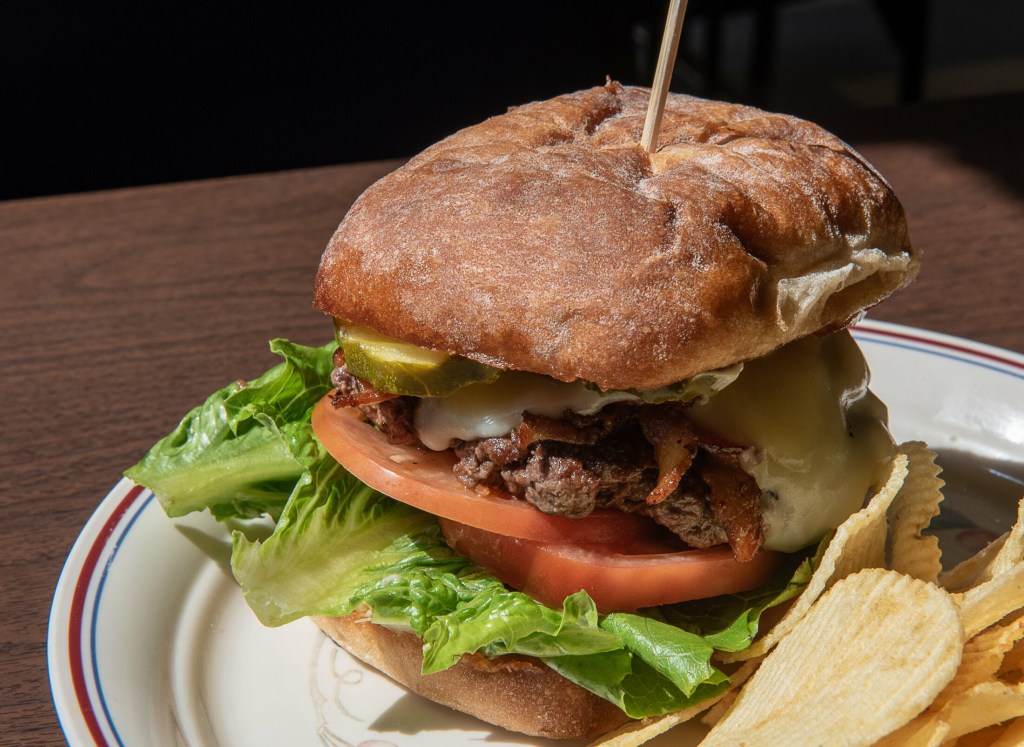

Comments are no longer available on this story